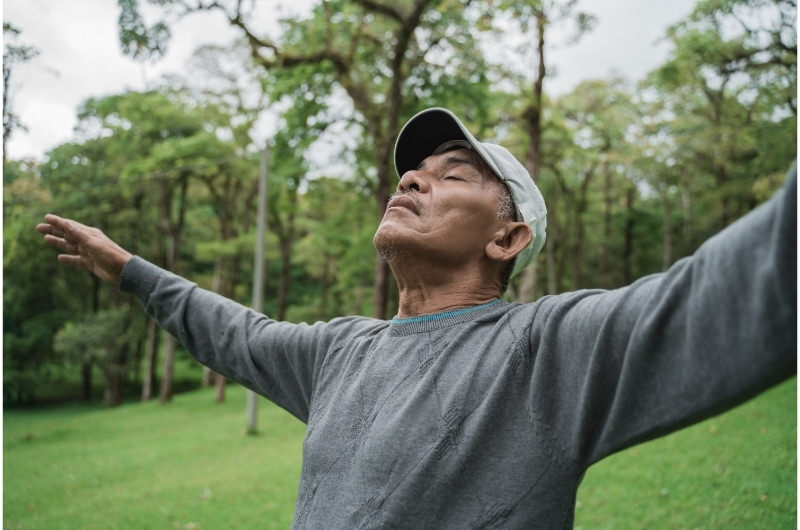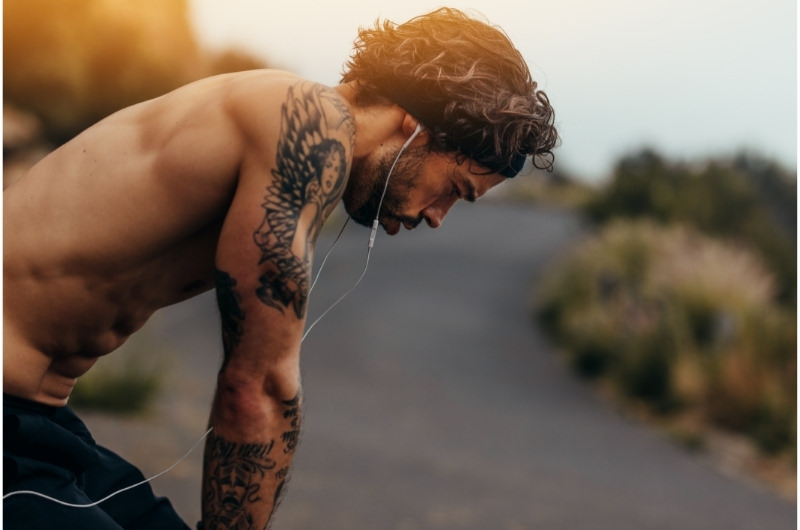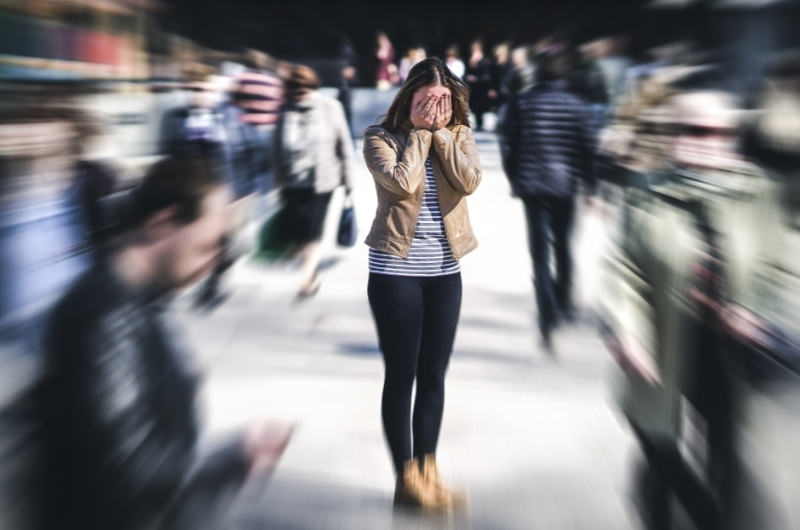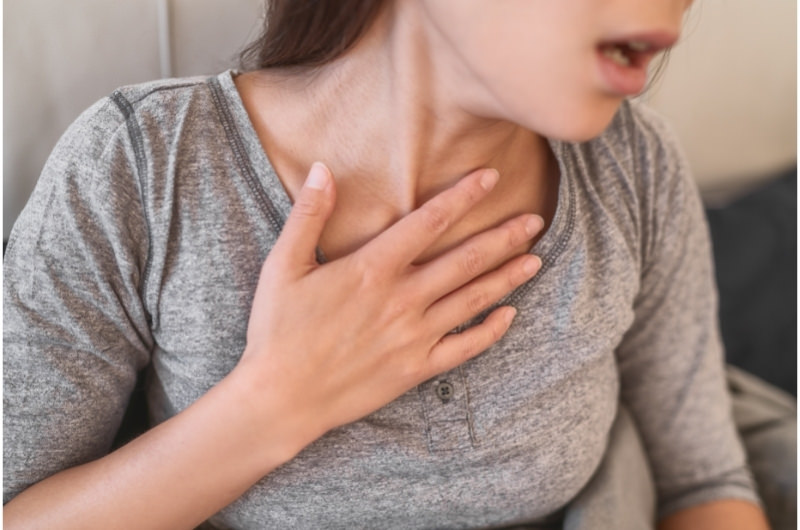COVID-19 survivors can face this problem for quite some time, but mostly this constant urge to take a deep breath is a sign of anxiety or air hunger. I wasn’t feeling anything close to stress, but the doctor ruled out the cause to be anxiety. I received some medications and advice on dealing with the situation, and I felt better.
I am a 28-year-old woman, and I have experienced shortness of breath in the past few months since the year 2021 started. I eat healthy diets and often perform exercises, so I believe I am in good health.
Being a survivor of the Covid-19 disease, which broke out in 2019, I associated my shortness of breath and the urge to take deep breaths with the post-effects of the virus. When the feeling persisted, I visited the hospital and was diagnosed with severe anxiety.
Could you be experiencing shortness of breath that leads to the urge to take deep breaths accompanied by continuous yawning? Keep reading this article as we learn what causes these symptoms and how to deal with the situation.
What is this urge to take deep breaths?

The feeling of constantly wanting to take deep breaths may get termed as air hunger. Air hunger has a technical term known as Dyspnea.
A person will also feel as though the air they breathe was insufficient, and they needed to take a deep breath to attain satisfaction. But taking deep breaths and sometimes yawning doesn’t seem to help the situation.
Symptoms of air hunger
When experiencing the urge to take deep breaths, other symptoms may surface, including:
- Shortness of breath and a tightness sensation in the chest cavity.
- An incredible urge to take deep breaths. Whenever the air you breathe feels insufficient, you get the desire to take deep breaths to compensate for the breathing difficulty.
- Some people experience yawning during the period they feel an urge for taking deep breaths.
In most cases, we may experience this feeling after a vigorous activity like exercising. If the episodes that someone encounters the air hunger symptoms increase, they should see a doctor.
What causes dyspnea?
Dyspnea may as a result of heart or lung diseases. Some people get this urge to take deep breaths after a vigorous activity or exercise.
If you experience Dyspnea, it would be best to visit the doctor to rule out the cause and get adequate treatment. The causes of this condition have two categories.
Physical causes of dyspnea
The urge to take deep breaths commonly associated with shortness of breath may occur as a result of:
Change in altitude and weather conditions
When we move to high-altitude areas, we may experience cycles of shortness of breath and Dyspnea. In high-altitude areas, the oxygen level decreases, thus making the lungs receive a short oxygen supply.
In return, our bodies get low oxygen concentration in the blood. While trying to compensate for the limited oxygen levels, an automatic body response makes us feel the need to take deep breaths.
Once we move to lower altitude levels, this feeling fades away, and the condition lasts for a short duration when we stay at the high altitude area. The effects become temporary.
Temperature changes
When the temperature rises, our bodies’ metabolism increases, making it necessary to have more oxygen. During this time, you may experience the urge to take deeper breaths and compensate for the high metabolism.
This reaction may be an involuntary reaction by the body to try and cool down. When the temperatures go down, our bodies may stabilize, bringing an end to the condition.
During exercises and vigorous activities

We may experience shortness of breath with the need for deeper breaths. This reaction happens for the body to supply enough oxygen to the lungs to oxygenate our blood.
Once we relax, our breathing normalizes, and the urge for deep breaths goes away.
Health-related causes
When you get the urge to take deep breaths without any of the above factors being the cause, it might be due to an underlying health condition. If this feeling comes when doing the things you normally do, you might consider talking to a doctor for further tests to determine the Dyspnea triggers.
Some health conditions that may be associated with Dyspnea include:
Covid-19/Coronavirus disease
The Coronavirus strain, Covid-19, causes Dyspnea symptoms in most of its patients. Since the disease affects the lungs and the pulmonary system, the patient experiences low oxygen levels in severe cases.
When this lung damage happens, the urge to take deep breaths sets in as the body struggles to get more oxygen.
Although, as of July 2021, researchers have not yet found a cure for related Covid-19 effects, many vaccines have been developed to inactivate the virus. Still, most people suffering from it may experience anxiety.
Anxiety also causes this condition in most people. Researchers from Harvard medical school suggest several ways to relieve patients of the air hunger resulting from the Covid-19 using opiates.
Panic attacks

Although it might feel as if you may not be panicking, anxiety may be the cause of your urge to get more air by breathing deeper. When we get a panic attack, the heart beats faster as our body muscles constrict.
As the muscles around your body tighten, so do those around your lungs. This feeling results in shortness of breath and the desire to breathe deeper to get sufficient air into the lungs. A panic attack may leave you scared and uncomfortable at the same time.
To rule out anxiety, the doctor needs to conduct some checkups and come up with ways to help you mitigate the effects of Dyspnea.
Low blood pressure
Unknown to many people, low blood pressure may result in Dyspnea in some patients. This is because if the blood pressure drops, our red blood cells may fail to acquire oxygen at the speed they require.
This low-oxygen scenario causes a decrease in the amount of oxygen circulating in our bodies. So, in return, we yawn, sigh and take deeper breathes as involuntary actions to try and compensate for the little oxygen in our blood system.
Once this feeling of inadequate air sets in, consider having your blood pressure checked and receive the desired medical attention.
Allergy
When we get allergies in the respiratory tract, it may result in breathing irregularities. In addition, stress or damage to the respiratory system may result in Dyspnea symptoms.
When allergens disrupt our respiratory wall, it results in respiratory stress. This stress or damage limits air absorption into the lungs and causes us the urge to take deep breaths as we may experience insufficient breathing.
When the allergies get treated, our respiratory system resumes normal functions, and we get to live well again.
Asthma
For asthmatic people, this urge may be a shared experience. When asthmatic people experience triggers to their condition, their airways begin to swell. The respiratory muscles tighten as well, and the airways constrict.
When this tightening and swelling happens, air doesn’t move freely in and out of their respiratory system.
This scenario results in less oxygen absorption in the lungs, and the patients feel the need to take deeper breaths. As a result, their breathing gets interfered with, and they experience shortness of breath and other Dyspnea symptoms.
After medication, the swelling of the airways reduces, and the respiratory muscles relax, allowing air to move freely into the lungs. When enough oxygen gets absorbed in the blood, the breathing pattern normalizes.
If you have asthma, it’s recommended to have your medication to help ease the symptoms if you encounter an asthma attack.
Iron deficiency
When our iron levels go down, so does hemoglobin in our blood. When this happens, oxygen levels go down due to the absence of enough hemoglobin to transport enough oxygen in our bodies.
As a result of this deficiency, the urge to take deep breaths sets in, accompanied by increased breathing rate and a feeling of shortness of breath.
All these symptoms come as the body tries to get more oxygen to compensate for the low oxygen levels.
It’s advisable to visit the hospital and have your hemoglobin level checked when you experience Dyspnea symptoms. After proper medication, the hemoglobin levels rise, and you don’t feel the disturbing urge anymore.
Pulmonary Embolism (PE)
When blood clotting occurs in a large vein, especially the leg, it may travel/embolize into the lungs. When PE occurs, the clot causes mild or severe symptoms, including:
- Difficulty in breathing
- Shortness of breath
- Low blood pressure
- Shock
- Cardiac arrest
These symptoms signify a significant drop in oxygen levels in the blood hence the urge to take deep breaths. Deep breaths will be a way to increase the oxygen levels in the blood by taking in more air into the lungs.
This scenario emphasizes the need to see the doctor once Dyspnea symptoms set in.
Pulmonary Fibrosis
Pulmonary fibrosis causes scarring of the lungs leading to scars and tissue thickening. In addition, this condition affects the lung’s ability to absorb enough oxygen into the blood.

The urge to take in more oxygen by developing involuntary deep breaths serves as a symptom of this condition. Other symptoms presented with this disease include:
- Shortness of breath
- Urge to take deep breaths constantly
- Dry cough
- Fatigue
- Sudden unexplainable weight loss
- Tips of fingers and toes widen and become round
Hyperventilation
This condition tends to be a symptom of stress and anxiety. A person experiencing it will take deep and fast breathes, which results in over-breathing.
The disease affects the carbon dioxide and oxygen levels in the blood, leaving you feeling sick.
A summary of the causes of Dyspnea
| Physical-related causes | Health-related causes |
| Changes in temperature | Covid-19 |
| Changes in altitude | Asthma |
| Exercising | Low blood pressure |
| Indulging in vigorous activities | Anxiety |
| Allergy | |
| Panic attack | |
| Pulmonary Embolism | |
| Pulmonary Fibrosis | |
| Hyperventilation |
Frequently Asked Questions (FAQs)
Why do I always have the urge to take deep breaths?
As we have learned in this article, the urge may result from recent physical activity or a sign of an underlying health condition.
Why do I feel like I am not getting enough air?
When you feel as though the air you breathe isn’t enough may be referred to as air hunger or Dyspnea. This is because the oxygen levels in our blood drop as little air gets absorbed into the lungs.
What are the signs of Dyspnea?
You may experience difficulty breathing, an urge to take deep breaths, or excessive yawning and sighing.
Will Dyspnea go away?
Air hunger goes away when the trigger to the condition gets eliminated. In some cases, it presents itself as temporary. If it doesn’t go away, treating the underlying health condition results in relief.
Final Thought
When it comes to Dyspnea, visiting your doctor will help determine the cause of your symptoms and develop the perfect treatment plan.
The urge to take deep breaths may indicate a life-threatening condition like pulmonary fibrosis, which requires early intervention for better treatment and improved quality of life. If you get the symptom, don’t hesitate to visit your doctor for professional help.


